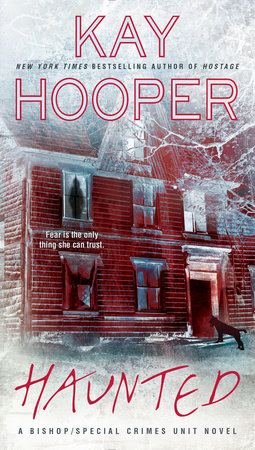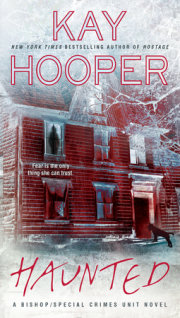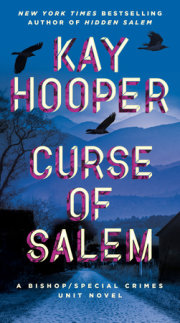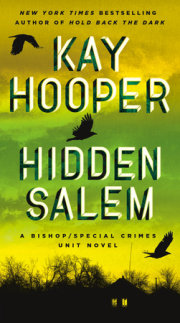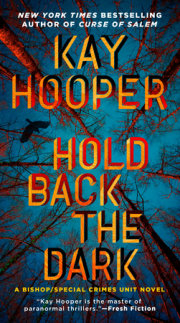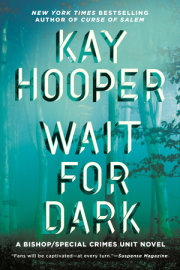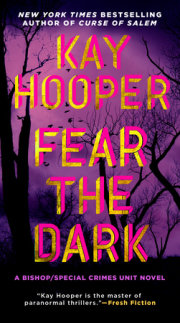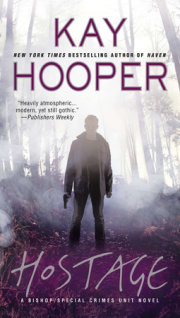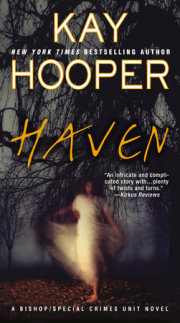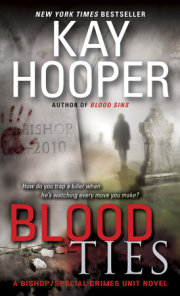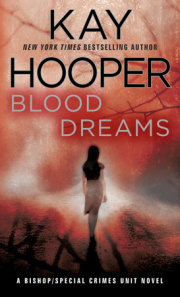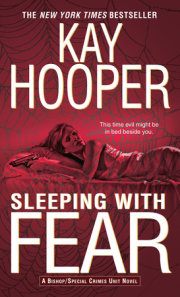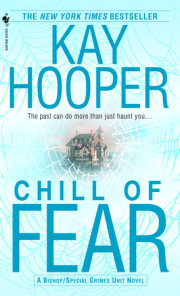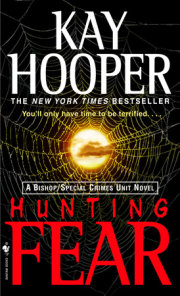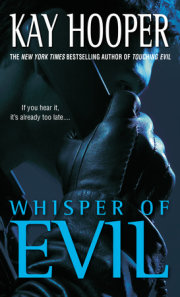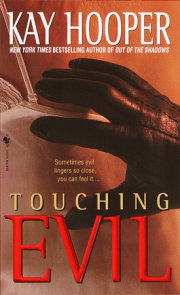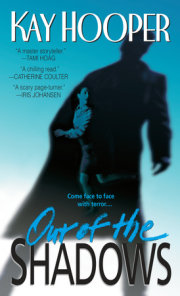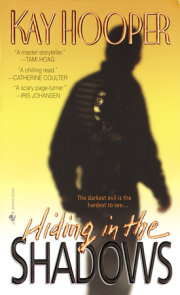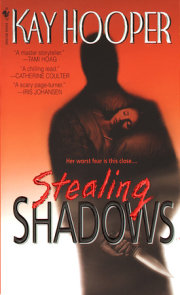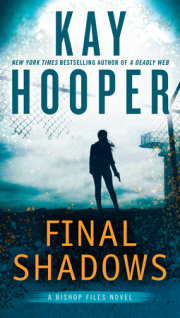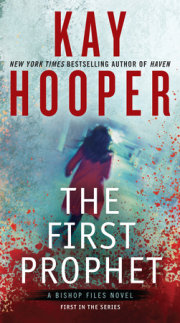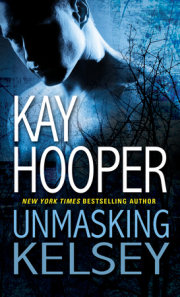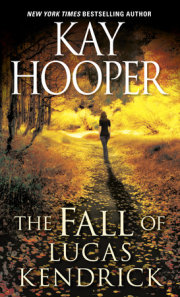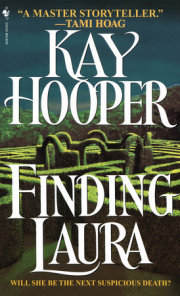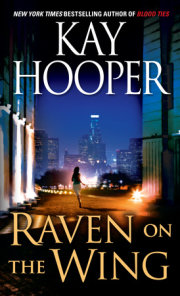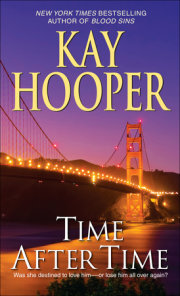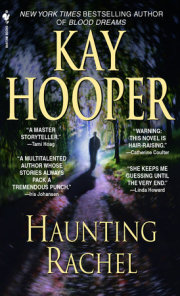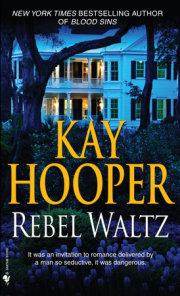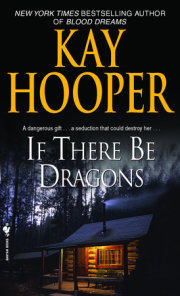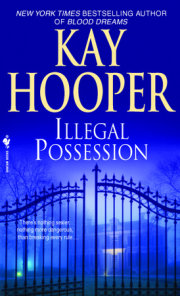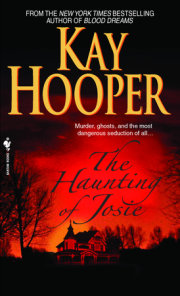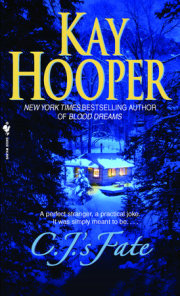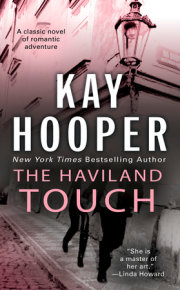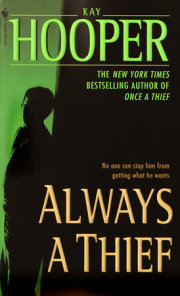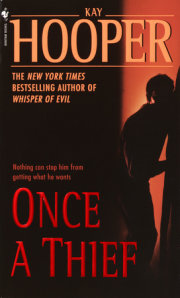***This excerpt is from an advance uncorrected proof***
Copyright © 2014 Kay Hooper
Prologue
December 12
The face in the mirror was strange to him, and not only because it was streaked with blood. The blood was the least disconcerting thing he saw, and some deeply buried instinct told him he should have worried a lot more about both the blood and his acceptance of it.
But he didn’t.
It was the strange face that worried him. It wasn’t always strange, of course. Sometimes he looked into the mirror and saw familiar features, eyes he knew, a smile that was pleasant and crooked and his own, with no blood marring anything he saw. On those days, he was fine. On those days, he went about the business of living and felt normal.
But on days like this . . .
He stared for long minutes at that alien face, the blood streaking it . . . baffled and a little frightened.
More than a little. Because even though he didn’t think much about the blood, it was there. And yet, the blood almost always disappeared when he closed his eyes and counted to ten and looked again.
Almost always.
But when it didn’t disappear, when he had to splash water on his face and even use soap to scrub away the red stains, he had the gnawing certainty that he should be worried about the blood, because it was a sign that even though he couldn’t remember what it was, he had done Something Bad.
Something Really Bad.
There were things he needed to remember, and every time he saw that face in the mirror, every time it was bloody and alien to him, he was aware of those unremembered things hovering in the shadows of his mind.
Desires. No . . . hungers. Needs.
Terrifying needs.
On those days, he called in sick and sat in his tiny apartment, furnished in Early Salvation Army, the worn shades drawn, the ancient TV that still had snowy channels on but muted, the sounds of traffic outside a sort of background noise that was unimportant.
On those days, he sat in the dark and listened to the voices telling him what he had to do. They were very clear, those voices. Very strong. Very sure.
And, gradually, without his even becoming aware of it, the fear faded away to nothing, because he wasn’t alone anymore. The voices were his friends. The voices understood him. The voices told him what he had to do.
As the days and weeks passed, he was eventually fired for calling in sick too many times so he could be alone in the dark listening to his voices, but by then it hardly mattered. He packed up his meager possessions in his worn duffle bag and left the old apartment building, and set out on foot because he didn’t own a car.
There was a journey he had to make. And along the way, he had things to . . . understand. Things to . . . practice. And things to plan.
Still, he wasn’t certain that he was doing the right thing. Not until his path took him higher into the mountains to one of the hiking trails along the Blue Ridge. Once he set foot upon those old, old trails, he felt at home.
And he knew where he was going.
South.
He stopped at one of those places that usually sprang up near the entrances to hiking trails and offered for sale just about anything one would need to hike the trails and paths woven all through the old mountains, and spent most of his money buying the few things he would need.
He wasn’t worried about money. The Lord would provide.
There was a crowd of hikers about, stocking up for hikes, or taking a break because their journey paused here, or began here. A number of people spoke to him, and he replied politely without making any effort to engage them in conversation.
Several invited him to join their groups, but virtually all of them were headed north, and that wasn’t where he was being drawn. So he declined, politely, and went on his way before he got too late.
He was only a little surprised to realize there was a map in his head, that all this was familiar ground. Part of him remembered it very well—and yet to another part of him, it was an alien landscape.
He traveled only about half a mile before darkness began to fall, and he took the time to set up his little tent and make camp, the skills again both familiar and strange.
He thought about that as he lay in his sleeping bag in the darkness, listening to the night. He thought about the skills that felt familiar—and the names in his head.
There were, he knew, people who had to pay.
That was something he was certain he knew how to do.
Get justice.
Be the sword hand of God.
When he realized that, all his confusion and uncertainty melted away.
And the plan began to take shape.
Chapter One
January 23
Melanie James shook her head and said to one of her best friends, “See, I think you stack the deck when you’re dealing out the cards.”
“It’s tarot, not poker,” Toby Gilmore objected. “Why would I stack the cards?”
“To give me the future you want me to have, of course.”
Toby sighed and looked at the other four people at their large table in the Friday-night-busy restaurant. “Help me out here, will you?”
Annabel Hunter shook her head solemnly. “Not me. I don’t care if you stack the deck; last week you told me I’d find that ring I lost, and I did the very next day.”
Xander Roth, dark eyes dancing, said to Melanie, “I’m with you. She cheats. I wasted my money on those lottery tickets.”
“I warned you about that,” Toby told him. “It’s cheating, and the universe doesn’t like that. Picking lottery tickets or winners in a horse race or anything like that is just not what tarot is for.”
“Then what is it for?” Scott Abernathy asked. “If the point is to see the future—”
“That isn’t the point. Always. And even when it is, the future is always fluid, I keep telling you that. You don’t plan your life with tarot, you just . . . let it guide you sometimes.”
Caleb Lee, the only one at the table not drinking wine or beer, said, “Toby is right; the cards are only tools to help you focus. When you’re centered and calm, then maybe the cards will tell you something helpful. Or maybe not.”
Scott rolled his eyes. “Yeah, yeah. Meditate and concentrate and all good things will come to you. We’ve heard the spiel, Caleb. Again and again.”
Caleb didn’t appear at all dismayed by the sarcasm. Which didn’t surprise anyone at the table, since he was virtually never dismayed. By anything.
Toby said, “Listen, I didn’t meant to start a fight or anything. It’s just that I thought reading for Melanie might be a good thing.” She kept her gaze on her friend as she shuffled the cards, smiling. She didn’t look at Scott at all.
Melanie said dryly, “You’re about as subtle as neon, Toby. Stop trying to give me the happily-ever-after, especially with Scott.” Even to her own ears, that last sentence had the air of flinty finality.
“Hey,” Scott said, “I thought the group rule was no rehashing over relationships, especially at dinner.”
Xander said, “Well, you will keep dating all our female friends, and then breaking up with them or pushing them to break up with you. God knows why they keep accepting you, but—”
Annabel, ever the peacemaker, said, “Can we please not talk about this? Scott and Melanie had a little fight, and the fact that we all know about it just underlines one of the perils of living in a small town. They deserve their privacy, and besides, it really is none of our business.”
Melanie sipped her wine, trying not to sigh out loud. They’d grown up together, her friends, and at times like this it really showed. She would have preferred her relationship with Scott—not exactly in the distant past—to remain between the two of them, but she had lived in Sociable for nearly three years now, and if she’d learned nothing else it was that there weren’t many secrets.
Especially among a group of friends who had played together in the sandbox thirty-odd years ago.
“It wasn’t a little fight,” Scott said, mildly enough but with a glitter Melanie recognized in his eyes. Despite his earlier words, he was perfectly willing to pick a fight in order to rehash not only that final battle but all the others in their brief but tempestuous relationship.
She spoke up before he could enlighten the others about whatever they might not already know, saying firmly, “But it was a private fight. Can we keep it that way, please?”
“Now, see,” Xander said, “that’s just going to make it worse. Because we’ll all be imagining. And whatever we’re imagining is bound to be worse than the truth.”
“Don’t you have satellite TV to entertain you?” Melanie asked him, rather sharply this time.
“Yes, but it’s not nearly as much fun.” Xander was a good guy, most of the time, but he did have a streak of mischief in his nature that could be just this side of cruel, Melanie had decided. “I mean, usually it’s Scott’s conquests who get dumped; something he’s generally not as obviously pissed off about as he is right now.”
“You’re a menace,” Melanie told him.
“Just calling ’em as I see ’em,” he retorted.
Scott said to Melanie, “Is that what you’ve been telling everybody, that you dumped me?”
“I,” Melanie said evenly, “have not been discussing my private relationships. It’s a preference I have. Not unlike the preference to avoid discussions like this one in crowded restaurants.”
“Ouch,” Xander murmured.
“I don’t get dumped,” Scott said, a bit louder than he’d intended.
Or not.
“Fine,” Melanie said, “you dumped me. Happy?” The matter was clearly so unimportant to her that it caused Scott to flush a rather ugly shade of red.
“I don’t think he’s happy,” Xander noted helpfully.
With uncharacteristic fierceness, Annabel said, “Scott, can you please pack away your ego and just let it go? You were no more serious about Melanie than you were about Toby—or about Trinity. Notches on your belt—”
“Speaking as one of the notches, I should probably resent that. But what the hell.” Trinity Nichols joined the others, sliding in next to Annabel in the booth seating that enabled them all to fit around the big table. “Who knows—we all may hang in the Smithsonian one day, in the wing of Famous Conquests.”
Toby noted Scott’s lingering flush and wondered in satisfaction if he was finally catching on to the fact that the women who passed through his life and fleetingly shared his bed did so far more often on their terms than on his. Whatever he thought otherwise.
Xander laughed, but reached across the table to offer Trinity wine for the empty glass their attentive waiter had placed before her. “Off duty?” he asked.
“Yeah. And I could use a drink.”
Xander poured her wine but was unusually serious when he asked, “Trouble?”
“Not local.” She shook her head, as usual a bit hesitant to share the burdens of being sheriff of Crystal County with her childhood friends, even though the lifelong habit of sharing—even sharing Scott, as it turned out—was difficult to break. “It’s just that usually this time of year, the dead of winter, we don’t get reports of missing hikers along the Blue Ridge. That’s rough country, and in winter fairly miserable even this far south. Hikers are usually spring to fall.”
Toby lifted a brow at her friend. “You said not local?”
“No, it isn’t. Or—they aren’t, rather. Four young women reported missing from the general area of western North Carolina to just north of us. That’s a fairly small span of the Blue Ridge even though it’s thousands of acres, and a little too close to home for my peace of mind.”
“All hikers?” Caleb asked.
“In two cases, it seems certain they are—or were. Hiking with friends, supposedly just a day’s outing during that unusual warm spell we had around Christmas, so not that unusual; in a rough winter, people want to get out when the weather’s unexpectedly good. Except that according to their friends, they were there one moment and gone the next.”
“All four went missing then?” Scott asked, making a clear effort to be casual.
“First two, just after Christmas, on the twenty-seventh. The latest two sometime between yesterday and today.”
“Both today? I mean, were they together?”
Trinity sipped her wine and nodded. “Apparently together when they went missing, but no witnesses. Still far enough north that the search is being concentrated miles away with some very rough terrain between here and there. But these latest two . . . Not really hikers, or so it seems. They were together, on their way home from a ski trip, and stopped to pull their car off on one of the lookout points, apparently to take in the view. And the state police found the car today, this afternoon—two days after family members insisted they had left the ski lodge forty miles away and headed for home.
“They had no supplies except a couple of bottles of water and a few granola bars. Neither was even wearing hiking boots, and all the warm clothing they had taken to ski in was still packed in their luggage. According to the checkout desk at the lodge, when they left there they weren’t really dressed for overnight in the mountains.”
“Dumb,” Scott said.
“Maybe they found shelter,” Annabel suggested, hope in her voice.
Sheriff Trinity Nichols swirled the wine in her glass and watched as it caught the light. “Maybe. Except they weren’t supposed to be there to hike, so why get very far from the car at all? A report came in just as I was leaving the office. Search dogs found a shoe belonging to one of the girls. About five hundred yards from the lookout, and heading straight up a mountain. No footprints or other signs the girls were in the area. And as far as the dogs were concerned, the trail ended there.”
Sociable, Georgia, was a small town by most any standards, boasting no more than five thousand or so permanent residents; during the tourist season a few thousand more passed through or even stayed a while, drawn by spectacular scenery, friendly residents, and a number of shops offering stunning handwoven textiles and other locally handcrafted items.
Tourists passing through invariably left with a good opinion of the town and its residents.
Sheriff Trinity Nichols, on the other hand, not only had to deal with the usual practical and political irritants endemic even in small and friendly towns but had also grown up here—and knew the people better than many of them either liked or would have wanted to admit.
Such as Sociable’s mayor, who suffered under the burden of having the surname of “Fish.” It had not made his childhood particularly happy and had proven bothersome to his adulthood as well.
There was just no way to make Elect Dale Fish Mayor! look good on a campaign poster, he had discovered. And he’d probably always wonder in his secret heart if he would have won if he hadn’t run unopposed.
“It’s vandalism, Trinity. And you’re not going to do anything about it?”
She wanted to reply that she was in her office on a Saturday, her day off, in order to respond to his summons—in other words taking his concerns seriously—but instead kept her tone businesslike.
“What do you want me to do, Dale? I’ll replace the sign, but if you believe taking away a no trespassing sign with a ghost drawn on it is going to keep the kids away from the church and parsonage, you can think again. I’ve already replaced that sign three times—just since Halloween.”
“We need a fence around the place,” he fretted.
“Well, that’s more your bailiwick than mine,” she reminded him. “Talk to the commissioners. But I’m betting they’ll balk.”
“Why?”
“A fence around a church. Think about it.”
It was clear he hadn’t until just then, and he slumped in the visitor’s chair in front of her desk. “Dammit.”
“Why worry about it at all, Dale? No actual damage has been done to the property. In fact, from what I’m hearing, the kids dare each other to touch the front door and then haul ass, running halfway down to Main Street before they stop. It’s just to prove to each other how brave they are.”
“I just don’t like it. That might be what they’re doing now, but no more than a year before you became sheriff, a team of those ghost hunters decided to stay the night in the parsonage, and even if nobody knows what happened, they were gone by daylight.”
“Leaving the place undamaged, even if the front door was standing wide open. I read the report. And whatever did or didn’t happen didn’t end up on TV or YouTube, for which we can be grateful. So?”
“So how long will it be before some of the older kids dare each other to spend the night in the church or parsonage?”
“Don’t hold your breath. It’s just the younger kids trying to prove they aren’t afraid of ghosts. The older ones are way too caught up in teenage stuff to worry about whether a local landmark is haunted. Though I imagine the preacher’s story gets told around the occasional fireplace or campfire.”
“I wish you wouldn’t be so cavalier about it,” the mayor complained. “It was a tragedy, what happened up there.”
“Yes, I know. But it also happened a decade ago, and I’m being practical, or trying to. Dale, what is it you hope to accomplish? The Baylor sisters own the parsonage, and if they want to allow visitors—ghost hunting or otherwise—it’s their business. As for the church, it’s a respected historical landmark, kept in good repair, and hasn’t been vandalized in my memory. So?”
Mayor Fish rubbed the back of his neck, clearly uncomfortable.
Trinity eyed him. “Come on, spit it out. What’s really bugging you about the church?”
“I’ve just . . . heard things.”
“For instance?”
“At least two people I know aren’t imaginative have told me they saw the stained-glass windows of the church glowing in the middle of the night. A flickering glow, as if a fire burned inside.”
“And they didn’t call the fire department?”
“It wasn’t that kind of light. I mean, they were sure the church wasn’t on fire.”
“And they were close enough to be sure?”
He sighed impatiently. “With binoculars, yeah, they were sure.”
“And didn’t see anything else suspicious? Through those binoculars?”
He flushed. “No. They didn’t see anyone hanging around the place, or an unfamiliar vehicle, or anything like that. It was days ago, and, yes, the church is still standing. I drove up there yesterday to make sure there was no damage—which is when I saw the no trespassing sign defaced.”
“Okay, okay.” She frowned at him. It was sometimes difficult to take Mayor Fish seriously because he was a fretful man by nature and tended to fret about minor things, but Trinity had learned to read him well enough, she thought, to know that he was seriously bothered.
And not telling her everything.
“Look, I’ll check it out,” she told him. “I’ll go up there and make sure all is well. Talk to the sisters and find out if anything odd has happened at the parsonage. Look for signs of trespassers past the age of twelve, and make sure the church is locked up tight. How’s that?”
“All I can hope for, I guess.” He clearly realized that hadn’t been either the most gracious or the most professional response and cleared his throat as he rose to his feet. “Thanks, Trinity, I appreciate it.”
“No problem.”
She gazed after him for a long moment, then looked down at the black dog who had been lying silent and motionless on his bed behind her desk. “Come on, boy,” she said, rising. “Let’s go see if we can figure out what has Dale so worried.”
“No trouble to speak of, Sheriff,” Edith Baylor said, her round face placid as always. “Haven’t seen anybody poking about the church or graveyard, and no sign the parsonage has been disturbed.”
“Are you and Lana in the parsonage much this time of year?” Trinity asked, referring to the other Baylor sister, now a widowed Lana Price; the two sisters did not live together, and Lana, according to her sister, was out at the mall near the highway, shopping.
“Oh, we go in with the cleaning crew every other week,” Edith replied comfortably. “Janet and her girls don’t really like being in the house without us. Same thing with the church, really. We don’t mind, Lana and me. Even though the church belongs to the town, it was Baylor land for generations, so we feel a duty to make sure everything is kept as it should be.”
“No more ghost-hunting crews asking to stay overnight?”
Edith smiled. “No, and only two groups came through back in the summer. I gathered from their disappointed faces that they didn’t find anything of interest.”
“Did you expect them to?” Trinity asked curiously.
“Not really,” Edith confessed. “They keep coming back year after year trying to find ghosts or some evidence of the supernatural, but all their little gadgets never show anything unusual.”
Trinity had the odd notion that whatever the ghost hunter’s “gadgets” had failed to show, Edith Baylor knew very well that the old parsonage was haunted—and was not the least bit disturbed by it.
And Trinity wasn’t quite sure how she felt about that.
“Okay,” she said finally. “I had a report that some saw lights coming from inside the church the other night. Know anything about that?”
“Afraid not, Sheriff. I can’t see either the church or the parsonage from here, obviously, and I seldom go out walking at night, especially this time of year.”
They were standing on the front porch of Edith’s small cottage-style house just a few streets back of Main, and Trinity knew without looking that neither the church nor parsonage was visible from this point.
“Except for the steeple, of course,” Edith added. “You can see that from just about anywhere in town.”
That was true enough, and something that had always bothered Trinity just a bit. Her father had told her that they’d built the church up high, to watch over the town, but if they had expected any special protectiveness, that isn’t what they’d gotten.
“Sheriff, would you like a cup of coffee? Tea?”
“Oh, no, thank you, Miss Edith.” Trinity realized guiltily that she’d kept the older woman standing on her porch for some time now in the chilly January air and hastily apologized. “I’m sorry to keep you so long. Just wanted to check in and let you know I’m going to drive up to the church and parsonage and take a look around. Just to make sure everything’s okay up there.”
Edith Baylor nodded, still placid. “Probably just as well you’re checking. I haven’t been up there since the cleaning crew was, and that’ll be two weeks on Monday. You know where the key is; if you want to go inside, feel free. I’ll give Lana a call on her cell—if she remembered to take it with her—and tell her you’ll be up there.”
Trinity had been about to turn away. “You think she’ll object?”
“Oh, no, of course not, Sheriff. She mentioned back last summer that we should probably invest in some kind of security system in the parsonage. But it didn’t make any sense to me, not when we’ve never even had a window broken.”
Which, now that Trinity thought about it, was a bit odd in and of itself, considering how the kids in town viewed both the church and parsonage.
“Here you go, Sheriff.” Miss Edith reached into the pocket of her apron—she wore one always except in church—and produced what looked like a bone-shaped cookie. “For Braden.”
Trinity knew her dog was visible sitting in the front seat of her Jeep only a few yards away, but she wondered just when the elderly lady had acquired the dog treat to give to him. When she had seen the Jeep pull into her driveway? Then again, perhaps her capacious apron pockets held all kinds of treats.
“Thank you,” she murmured.
“My pleasure. You have a good weekend, Sheriff.”
“You, too.” Trinity took a couple of steps back, then turned and retreated to her Jeep.
As soon as she was inside, she offered the treat to her dog. “With Miss Edith’s compliments. You want it now or later?”
Braden sniffed and made a soft huffing sound Trinity recognized. “Later then,” she said, dropping it into one of the cup holders in the Jeep’s console.
Very shortly, she had backed out of the cottage driveway and drove along one of what the locals referred to as cross streets that ran parallel to Main Street, the lowermost street in Sociable. The rest of the town proper climbed a mountain, literally; there were half a dozen streets that climbed straight up from Main, most reaching or nearly reaching the topmost cross street in front of the church, and a good dozen cross streets connecting most of them.
Trinity turned her Jeep and started up the mountain, catching a glimpse of the white steeple rising high above Sociable; it was indeed visible from nearly any vantage point in the town, though the church itself had long ago become hidden by overgrown shrubbery planted rather inexplicably all the way across its front and the graveyard beside it as well.
Her radio crackled suddenly. “Sheriff?”
She reached for the handset, using the one in the Jeep both because it was more reliable and because she hadn’t bothered to wear any part of her normal uniform except for her gun.
“Yeah, Sadie?”
“You asked to be notified if any more information came out about those lost hikers?”
“There’s news?”
“Not good, I’m afraid.” Sadie wasn’t really accustomed to dealing with violent subjects in a town like Sociable, so her shock was both obvious and entirely natural, even though she was clearly doing her best to sound professional. “Report is, a few hours ago they found the bodies of the first two girls miles south of where they disappeared. I thought they said more than seventy-five miles, but could that be right?”
Trinity said, “It would be an unusually large search area, even after weeks of searching. Unless they got a tip where to look.”
“Maybe that was it. Anyway, they . . . thought at first a bear had gotten to them, but . . . They said it was a knife, and a sharp one. Cut them all up, those poor girls.”
Trinity kept her own tone detached with an effort. “Raped?”
“No, and while I say that’s at least one thing they didn’t have to endure, it seems the FBI people they have on scene are saying it’s significant there was no sexual assault.”
“They say why?”
“Not that I’ve heard. You want me to call and ask?”
“No. No, I’ll do that myself. Anything else, Sadie?”
“Just a general warning to law enforcement to be on the lookout—though for who or what they don’t really say. Anybody suspicious, I guess. Asking that we spread the warning that nobody needs to be hiking the southern Blue Ridge right now. And that whoever murdered those girls might be heading south.”
Toward Sociable.
Neither of them said it.
Neither of them had to.
Copyright © 2015 by Kay Hooper. All rights reserved. No part of this excerpt may be reproduced or reprinted without permission in writing from the publisher.

